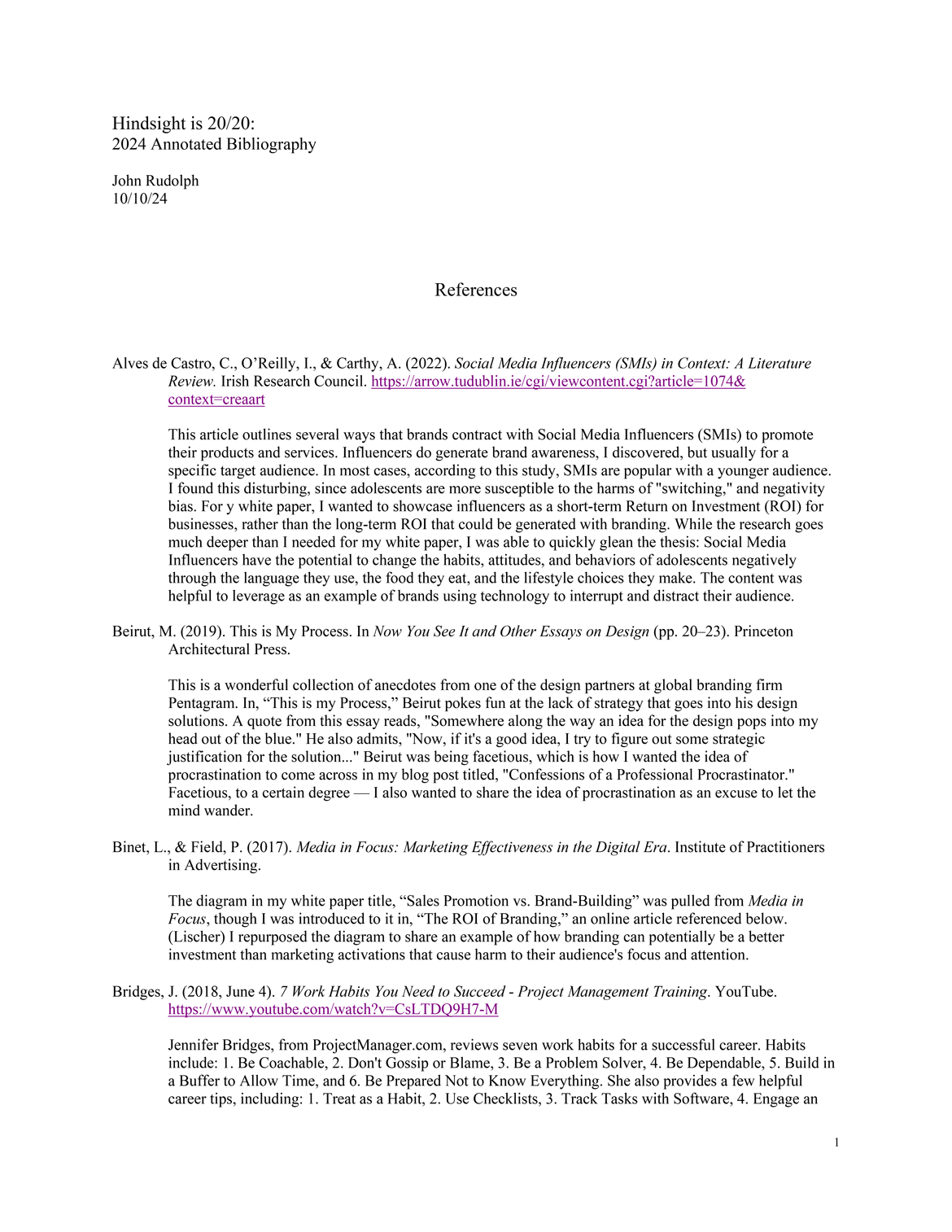Bibliography.
Crossing the Great Digital Divide
Hari, Johann. Stolen Focus: Why You Can’t Pay Attention. Bloomsbury Publishing, 2023.
Hari's book takes a deep look at the reasons why we, as both individuals and as a society in the Western World, continue to lose our ability to pay attention for prolonged periods of time. The author utilizes personal anecdotes in order to outline his theories, and elegantly weaves evidence — in the form of interviews with experts in the field — to form compelling arguments about the evil powers at play, and the specific ways in which our focus has been diminished. Hari also outlines possible solutions in order to regain focus.
Chapter Two, "Cause Two: The Cripping of Our Flow States," was particularly helpful in comparing the the use of screentime for social media among my family members. Hari mentions Mihaly Csikszentmihalyi's discovery in the 1980's that "staring at a screen is one of the activities we take part in that on average provides the lowest amount of flow." In questioning my personal relationship with social media, the examples provided throughout this chapter provide reason to question the power of technology over my family's ability to focus.
Confessions of a Professional Procrastinator
Duhigg, Charles. The Power of Habit. Memories of Ages Press, 2021.
If read casually, The Power of Habit is a self-help book. It provides compelling argument and rationale for starting simple, easy-to-acheive habits that act as the foundation for aspirational life changes and acheivements. If read actively, Duhigg provides the blueprint for community and business leaders to change the way our society can acheive positive change. Throughout the book, the author shares many examples of inspiring success stories, and the changes in habit that allowed for them to happen.
Chapter Four, "Keystone Habits, or the Ballad of Paul O'neill," focuses on the institutional change that the CEO of the Aluminum Company of America, or Alcoa, was able to acheive with his singleminded approach to employee safety. One of the unexpected results of employee's habit of sharing safety notes, thorugh an early adoption of email, was the sharing of information and ideas.
Hari, Johann. Stolen Focus: Why You Can’t Pay Attention. Bloomsbury Publishing, 2023.
Chapter Five, "Cause Five: The Disruption of Mind-Wandering," discusses the importance of having time to let your thoughts flow freely — to bounce from thought to thought without specific intention — that often produces unexpect solutions to challenges creative problems.
Harris, M. (2018, February 9). I have forgotten how to read. The Globe and Mail. https://www.theglobeandmail.com/opinion/i-have-forgotten-how-toread/article37921379/
Harris' main argument — that we have lost our ability to read long-form is the result of the internet — is supported by his own experience. He quotes and makes note of authors and researchers who corroborate his thesis, but the article doesn't dive deep into the science. I refence this article as one quick rebuttal in my blog post — that reading should't be used when you are looking to make abstract connections through "flow."
Bierut, M. (2019). Now you see it and other essays on design. Princeton Architectural Press.
A quote from essay three, "This is My Proces," reads, "Somewhere along the way an idea for the design pops into my head out of the blue." He also admits,"Now, if it's a good idea, I try to figure out some strategic justification for the solution..." Beirut was quoting himself fecitiously, which is how I want the idea of procrastination to come across — to a certain degree.
Less News is Good News
Hari, Johann. Stolen Focus: Why You Can’t Pay Attention. Bloomsbury Publishing, 2023.
In Chapter Six, "Cause Six: The Rise of Technology That Can Track and Manipulate You (Part One)," Hari talks about Mike Kreiger and Kevin Systrom's application of principles from professsor B.F. Skinner to build in positive reinforcements to change behavior. They added hearts and likes to the app they developed together, Instagram.
Hari Also discusses "nagativity bias," or the tendendancy of humans to focus on something negative for a lot longer than positive and calm — a phenomenon I experienced with the Apple News app.
Rhodes, M. (2015, October 19). This guy obsessively recorded his private data for 10 years. Wired. https://www.wired.com/2015/10/nicholas-felton-obsessively-recorded-his-private-data-for-10-years/
Nicholas Felton is a graphic designer that helped to develop the intitial timeline af Facebook, and became well-know for his yearly Annual Reports – designing detailed charts and graphs that detailed his life's data.
This article, featured in Wired Magazine, is a retrospective Q&A after ten years, when Felton has decided to stop collecting and sharing personal information. Two takeaways for my article: 1. Felton tried to collect data with the intent of having a positive influence in his life, and 2. Become more mindful of his environment.
Alexa, Cancel Surveillance Capitalism
Hari, Johann. Stolen Focus: Why You Can’t Pay Attention. Bloomsbury Publishing, 2023.
A reference to Chapter Six again, where we learned about the Persuasive Technology Lab at Stanford University. Tristan Harris, among others, utilize "immediate reinforcements" to make apps more engaging.
Hari, Johann. Stolen Focus: Why You Can’t Pay Attention. Bloomsbury Publishing, 2023.
In Chapter Nine, "The First Glimpses of the Deeper Solution," Aza Raskin discusses his belief that the best solution to invasive technologies' effect on our attention and focus is to ban surveillance capitalism.
To Solve, or to Shrug?
Hari, Johann. Stolen Focus: Why You Can’t Pay Attention. Bloomsbury Publishing, 2023.
I reference the invention and implications of the "infinite scrol" on page 120.
Participate, app.participate.com/assignments/module-1-setting-the-stage/f7514ee2-1433-45b3-949c-2eb88077abb1#chapter-4. Accessed 27 Sept. 2024.
Referenced the "Leverage Points Framework" diagram, based on Dr. Donella Meadows’ "12 Leverage Points to Intervene in a System."

Hindsight is 20/20:
2024 Annotated Bibliography

Contact
Phone: 203-304-1846
Email: johnrudolph@gmail.com
Instagram: @map.agency
© Topographic 2025